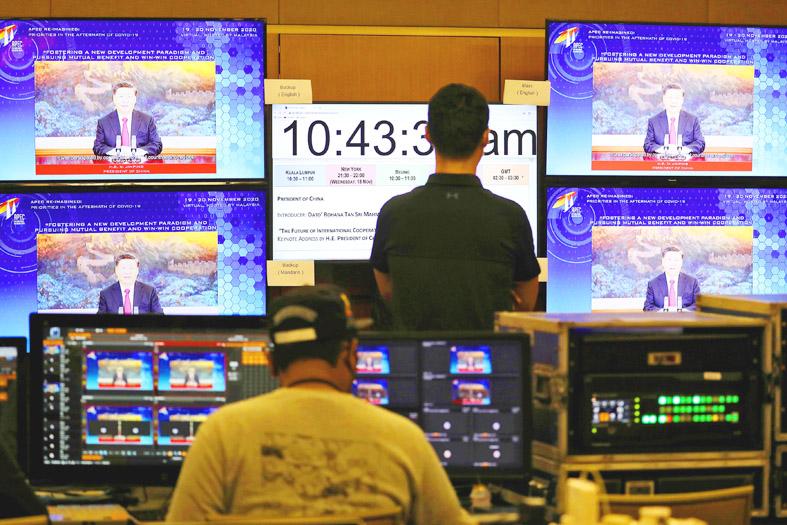China would consider joining a free-trade pact once championed by the US, but abandoned by US President Donald Trump, Chinese President Xi Jinping (習近平) said on Friday, as Beijing increasingly seeks to influence the global rules of commerce.
The Comprehensive and Progressive Agreement for Trans-Pacific Partnership (CPTPP) is an updated version of a giant deal originally backed by former US president Barack Obama as an effort to counter China’s rising influence in Asia.
Trump pulled out of it after winning the presidency in 2016 as he turned away from what he viewed as unfavorable multilateral deals, but 11 countries eventually agreed to sign the new version.

Photo: Reuters
Addressing an APEC summit, Xi said the grouping “must continue to promote regional economic integration and establish an Asia-Pacific free-trade zone at an early date.”
China “will actively consider joining” the CPTPP, he said, according to Chinese state media.
Trump attended this year’s virtual summit, the first time he has participated since 2017, as he continues to challenge his election defeat to US president-elect Joe Biden.
Xi’s comments came just days after Beijing and 14 other countries signed what would be the world’s biggest trade deal, the Regional Comprehensive Economic Partnership.
Taiwan has expressed an interest in joining the CPTPP, as it would be unlikely to gain membership in the China-dominated Regional Comprehensive Economic Partnership.
Singapore-based international trade expert Deborah Elms said that if China did join the trade pact, it might encourage others to follow.
“If Xi’s statement of interest is pushed forward in the coming weeks and months, it will, of course, lead to a lot of questions from current members, prospective members and others that are not thinking of CPTPP membership at all,” said Elms, executive director of the Asian Trade Centre.
Additional reporting by staff writer

The US government has signed defense cooperation agreements with Japan and the Philippines to boost the deterrence capabilities of countries in the first island chain, a report by the National Security Bureau (NSB) showed. The main countries on the first island chain include the two nations and Taiwan. The bureau is to present the report at a meeting of the legislature’s Foreign Affairs and National Defense Committee tomorrow. The US military has deployed Typhon missile systems to Japan’s Yamaguchi Prefecture and Zambales province in the Philippines during their joint military exercises. It has also installed NMESIS anti-ship systems in Japan’s Okinawa

‘WIN-WIN’: The Philippines, and central and eastern European countries are important potential drone cooperation partners, Minister of Foreign Affairs Lin Chia-lung said Minister of Foreign Affairs Lin Chia-lung (林佳龍) in an interview published yesterday confirmed that there are joint ventures between Taiwan and Poland in the drone industry. Lin made the remark in an exclusive interview with the Chinese-language Liberty Times (the Taipei Times’ sister paper). The government-backed Taiwan Excellence Drone International Business Opportunities Alliance and the Polish Chamber of Unmanned Systems on Wednesday last week signed a memorandum of understanding in Poland to develop a “non-China” supply chain for drones and work together on key technologies. Asked if Taiwan prioritized Poland among central and eastern European countries in drone collaboration, Lin

Renewed border fighting between Thailand and Cambodia showed no signs of abating yesterday, leaving hundreds of thousands of displaced people in both countries living in strained conditions as more flooded into temporary shelters. Reporters on the Thai side of the border heard sounds of outgoing, indirect fire yesterday. About 400,000 people have been evacuated from affected areas in Thailand and about 700 schools closed while fighting was ongoing in four border provinces, said Thai Rear Admiral Surasant Kongsiri, a spokesman for the military. Cambodia evacuated more than 127,000 villagers and closed hundreds of schools, the Thai Ministry of Defense said. Thailand’s military announced that

CABINET APPROVAL: People seeking assisted reproduction must be assessed to determine whether they would be adequate parents, the planned changes say Proposed amendments to the Assisted Reproduction Act (人工生殖法) advanced yesterday by the Executive Yuan would grant married lesbian couples and single women access to legal assisted reproductive services. The proposed revisions are “based on the fundamental principle of respecting women’s reproductive autonomy,” Cabinet spokesperson Michelle Lee (李慧芝) quoted Vice Premier Cheng Li-chiun (鄭麗君), who presided over a Cabinet meeting earlier yesterday, as saying at the briefing. The draft amendment would be submitted to the legislature for review. The Ministry of Health and Welfare, which proposed the amendments, said that experts on children’s rights, gender equality, law and medicine attended cross-disciplinary meetings, adding that